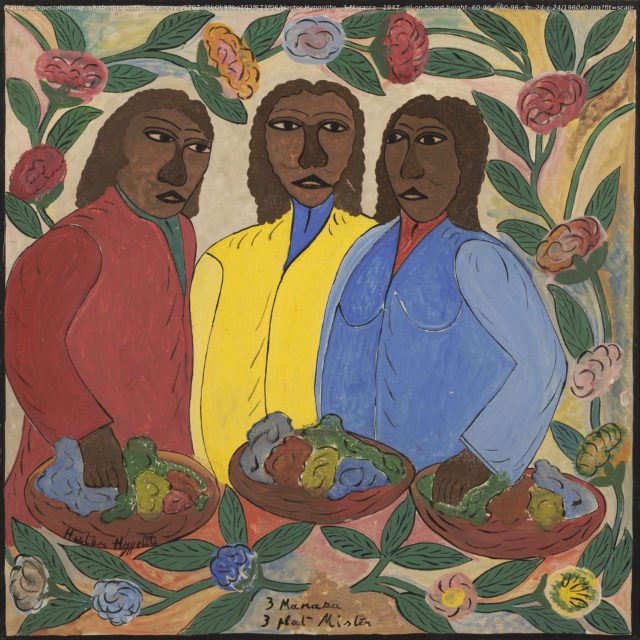America has never needed an art exhibition the way it needs “Spirit & Strength: Modern Art from Haiti,” on view through March 8, 2025, at the National Gallery of Art in Washington, D.C.
America has never needed an art exhibition the way it needs “Spirit & Strength: Modern Art from Haiti,” on view through March 8, 2025, at the National Gallery of Art in Washington, D.C.
Little-thought-of in America Haiti became national news this fall when presidential candidate Donald Trump and his running mate J.D. Vance spread wicked and baseless lies about Haitian immigrants in Springfield, OH. Not the typical lies told by politicians about immigrants being dangerous or taking American jobs, lies meant to cast Haitians–in the country legally–as sub-humans, stealing and eating people’s pets. Outrageous even for a finely tuned right-wing lie machine that has cranked up as the November election draws closer, pivoting from Haitian immigrants barbecuing cats and dogs in middle America to conspiracies about the government controlling the weather and making hurricanes stronger.
Republican Party slander about Haitian immigrants in Springfield led directly to bomb threats and the closure of schools and government buildings.
The National Gallery’s exhibition was announced almost a year ago in conjunction with a major gift Haitian art. It’s connection to the news cycle is purely coincidental. And fortunate. Here is where art, and art museums, can demonstrate their greatest powers. Art museums doubling as the nation’s best history museums. Art as lie-debunker. Art as an empathy machine. Art as travel guide. Art as de-otherer.
How many Americans realize that Haiti became the world’s first free Black republic in 1804? That Haitians pulled off the world’s largest and most successful slave revolt against French colonizers to achieve their freedom? That Haiti was the first nation to outlaw slavery?
“The enormous contribution to human rights, to the concept of human rights in the modern world,” Brooklyn College City University of New York Haitian Studies Institute Director Marie Lily Cerat told Forbes.com when asked what she wished more Americans understood about Haiti. “Haiti represents the only place in the world where a (successful) slave revolt occurred and you had former slaves creating this space where the idea of liberty, equality, and brotherhood was really illustrated.”
How many Americans know that slaveholding U.S. president Thomas Jefferson refused to recognize Haiti’s nationhood, fearing what ideas it may give the enslaved among his country.
“Haiti challenged the idea of keeping Africans enslaved for the United States and elsewhere, but (enslavers) knew what was happening, and not just the founding fathers of this nation, but around Europe,” Cerat explained. “People knew that the idea of slavery was a false narrative to exploit people who were less equipped with weapons of war to create wealth. They knew that Black people were not inferior.”
Jefferson and the Americans had words and ideals promoting equality, liberty, the pursuit of happiness. Words and ideals they didn’t have the conviction to put into action.
“Haitians believe in those ideals of every person is created equal and that was manifested by the slave revolt and the establishment of this nation at the dawn of the 19th century,” Cerat said. “It really gave birth to the idea of what we know as human rights, modern day human rights.






